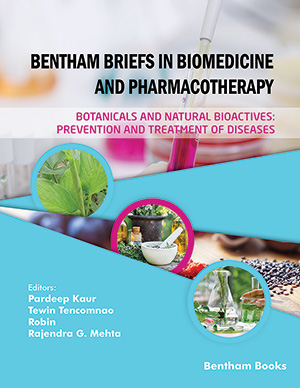
Abstract
Humans have used algae for hundreds of years to make various products viz. agar, fertilizer, food, and pigments. Algae are also used in bioremediation to clean up polluted water and as essential laboratory tools in genomics, proteomics, and other research applications such as environmental warnings. Several special features of algae, including the oxygenic photosynthesis, higher yield in biomass, growth on the non-arable lands, their survival in a wide range of water supplies (contaminated or filtered waters), the production of necessary byproducts and biofuels, the enhancement of soil productivity, and the greenhouse gas emissions, etc. altogether rendered them as vital bio-resources in the sustainable development. Algae and bacteria have been assumed to coexist from the early stages of the development of the earth, and a wide variety of interactions were observed between them which have influenced the ecosystems ranging from the oceans to the lichens. Research has shown that bacteria and algae interact synergistically, especially roseobacter- algae interactions being the most common. These interactions are common to all ecosystems and characterize their primary efficiency. The commercialization of algae for industrial purposes, an important field, is also influenced by this interaction which frequently results in bacterial infections among the consumers. However, the recent findings have revealed that the bacteria improve algal growth and support flocculation which are very crucial in algal biotechnology. Some of the most exciting advancements in the area of algal biotic interactions and potential difficulties were reviewed in this article. Information gleaned in this study would provide a firm foundation for launching more contemporaneous research efforts in understanding and utilizing the algal species in biotechnology industries and medical sectors.
Keywords: Algal-bacteria, algal biotic interactions, algal classification, parasitism, mutualism, interaction.
[http://dx.doi.org/10.1016/j.ejop.2016.09.003] [PMID: 27889663]
[http://dx.doi.org/10.1111/j.1550-7408.2005.00053.x] [PMID: 16248873]
[http://dx.doi.org/10.3390/md18120641] [PMID: 33327517]
[http://dx.doi.org/10.1126/science.1213561] [PMID: 22344442]
[http://dx.doi.org/10.1016/j.tplants.2016.12.007] [PMID: 28089380]
[http://dx.doi.org/10.1126/science.1257594] [PMID: 25678667]
[http://dx.doi.org/10.1111/nph.14760] [PMID: 28857164]
[http://dx.doi.org/10.1002/jat.4088] [PMID: 33289164]
[http://dx.doi.org/10.1016/j.phytol.2021.02.008]
[http://dx.doi.org/10.1007/s00227-018-3392-1]
[http://dx.doi.org/10.2307/1540052]
[http://dx.doi.org/10.3389/fmicb.2012.00292] [PMID: 22936927]
[http://dx.doi.org/10.1579/0044-7447(2007)36[203:MCFTCO]2.0.CO;2] [PMID: 17520935]
[http://dx.doi.org/10.1111/jam.14095] [PMID: 30168644]
[http://dx.doi.org/10.1038/ismej.2014.230] [PMID: 25526368]
[http://dx.doi.org/10.1038/nature04056] [PMID: 16267554]
[http://dx.doi.org/10.1111/j.1462-2920.2012.02733.x] [PMID: 22463064]
[http://dx.doi.org/10.1016/j.biombioe.2014.07.015]
[http://dx.doi.org/10.1016/j.biortech.2014.10.159] [PMID: 25459870]
[http://dx.doi.org/10.1371/journal.pone.0026458] [PMID: 22028882]
[http://dx.doi.org/10.1038/srep29929] [PMID: 27406267]
[http://dx.doi.org/10.3354/meps025023]
[http://dx.doi.org/10.1016/j.biotechadv.2015.12.003] [PMID: 26657897]
[http://dx.doi.org/10.1038/s41598-018-28543-2] [PMID: 29980756]
[http://dx.doi.org/10.1016/j.micres.2017.10.007] [PMID: 29146256]
[http://dx.doi.org/10.1093/gbe/evq075] [PMID: 21081313]
[http://dx.doi.org/10.1016/j.biocontrol.2009.10.004]
[http://dx.doi.org/10.3354/ab00402]
[http://dx.doi.org/10.3389/fmicb.2016.00161] [PMID: 26925036]
[http://dx.doi.org/10.1371/journal.pone.0206734] [PMID: 30517113]
[http://dx.doi.org/10.3390/md14050100] [PMID: 27213407]
[http://dx.doi.org/10.3390/molecules25040930] [PMID: 32093097]
[http://dx.doi.org/10.3390/molecules21050551] [PMID: 27128892]
[http://dx.doi.org/10.1186/1471-2164-13-487] [PMID: 22985125]
[http://dx.doi.org/10.1111/j.1574-6941.2010.00917.x] [PMID: 20579099]
[http://dx.doi.org/10.1111/1574-6976.12011] [PMID: 23157386]
[http://dx.doi.org/10.1073/pnas.1110633108] [PMID: 21810989]
[http://dx.doi.org/10.1093/molbev/msh075] [PMID: 14963099]
[http://dx.doi.org/10.1038/nature11681] [PMID: 23201678]
[http://dx.doi.org/10.1093/molbev/msj075] [PMID: 16357039]
[http://dx.doi.org/10.1111/j.1550-7408.2008.00371.x] [PMID: 19335769]
[http://dx.doi.org/10.1093/molbev/msh086] [PMID: 14963089]
[http://dx.doi.org/10.1126/science.1222700] [PMID: 22997339]
[http://dx.doi.org/10.1111/j.1365-2958.2006.05343.x] [PMID: 16968220]
[http://dx.doi.org/10.1126/science.1231707] [PMID: 23471408]
[http://dx.doi.org/10.1080/07391102.2021.1899050] [PMID: 33749496]
[http://dx.doi.org/10.1016/j.ibiod.2009.10.008]
[http://dx.doi.org/10.1038/ismej.2015.180] [PMID: 26495994]
[http://dx.doi.org/10.1186/s13036-017-0048-5] [PMID: 28127397]
[http://dx.doi.org/10.1128/AEM.02634-16] [PMID: 28115385]
[http://dx.doi.org/10.1016/j.hal.2017.11.002] [PMID: 29306393]
[http://dx.doi.org/10.1016/j.envpol.2020.115198] [PMID: 32668373]
[http://dx.doi.org/10.3354/meps08607]
[http://dx.doi.org/10.1046/j.1365-2672.2002.01717.x] [PMID: 12174050]
[http://dx.doi.org/10.1111/j.1529-8817.2007.00329.x]
[http://dx.doi.org/10.1111/j.1462-2920.2004.00706.x] [PMID: 15658990]
[http://dx.doi.org/10.1111/j.0022-3646.1997.00938.x]
[http://dx.doi.org/10.1007/978-3-540-31049-5]
[http://dx.doi.org/10.1126/science.1077075] [PMID: 12424372]
[http://dx.doi.org/10.1111/j.1529-8817.2012.01231.x] [PMID: 27009994]
[http://dx.doi.org/10.1007/s10811-013-0186-1]
[http://dx.doi.org/10.1038/nature14488] [PMID: 26017307]
[http://dx.doi.org/10.1016/j.hal.2003.08.001]
[http://dx.doi.org/10.1016/j.hal.2007.04.004]
[http://dx.doi.org/10.1007/s10750-012-1061-9]
[http://dx.doi.org/10.3390/toxins11040223] [PMID: 30991631]
[http://dx.doi.org/10.1023/A:1009200926452]
[http://dx.doi.org/10.1016/S0144-8609(98)00035-1]
[http://dx.doi.org/10.1080/08927019809378377]
[http://dx.doi.org/10.1080/02705060.2017.1323682]
[http://dx.doi.org/10.1111/j.1365-2672.2007.03439.x] [PMID: 17953609]
[http://dx.doi.org/10.1016/j.hal.2016.04.006] [PMID: 28073494]
[http://dx.doi.org/10.3389/fmicb.2016.00316] [PMID: 27047453]
[http://dx.doi.org/10.1038/nmicrobiol.2016.5] [PMID: 27572439]
[http://dx.doi.org/10.3389/fpubh.2018.00050] [PMID: 29536001]




























